|
Or John Kirkpatrick
and Local History Unleashed
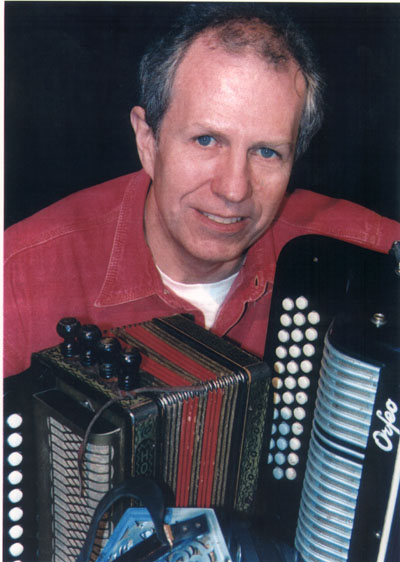
From the late 1960s John has been
at the very forefront of innovative folk in Britain, and has played with......well it'd be easier to list who John hasn't
played with.......He is regarded as one of the major figures of the English folk scene, and is much acclaimed as a musician,
composer, singer, and songwriter.
John
Kirkpatrick was born in Chiswick, West London in 1947. A deep love of music was instilled from birth, and family gatherings
always included a hearty sing-song. School choirs, the Church choir, playing recorder and piano ensues, until he joined the
Hammersmith Morris Men, in their second week, in 1959.
Whilst with the team he took up the melodeon, then the button accordion, then
the anglo concertina, and got hooked on the traditional songs that were accompanied with a post-dancing pint.
John has gone on to become one of the most prolific figures on the English folk
scene, performing solo, in duos, acoustic groups and electric bands, and has established an enviable reputation as an instrumental
virtuoso and session musician, as well as a leading interpreter of English folk music. He has been a member of the Albion
Country Band, Magic Lantern, The Richard Thompson Band, Umps and Dumps, Steeleye Span, Brass
Monkey, Trans-Europe Diatonique, and Band of Hope, as well as numerous ceilidh bands.
He rejoined The Albion Band for The National Theatre productions of "Lark Rise"
and "Candleford", and from 1980 has regularly worked on shows at The Victoria Theatre (later The New Victoria Theatre) in
North Staffordshire, The Orchard Theatre Touring Company based in Devon, and elsewhere. As songwriter, composer, choreographer,
and musical director, he has contributed to over sixty plays in the theatre and on radio. And as featured artiste, band member,
or session player, his music can be heard on over 200 different commercial recordings.
John has lived in Shropshire since 1973, where he had four sons by his first marriage.
Now happily re-married, he still dances, with all four sons (on a good day), with the Morris team he founded in 1975,
The Shropshire Bedlams
Now....what we're about here is what we've been about, elsewhere, tracking down
and listing all we can find, on John and morris dancing and morris sides in general, in the form of links, which, once
more, you'll find to your right....along with other links to things Shropshire
Ok we're off...you coming?
Shropshire Bedlams
&
Martha Rhoden's Tuppenny
Dish
Morris dancing teams. Shropshire
Bedlams (men)
and Martha Rhoden's (women)
meet every Tuesday 8pm - 10pm
for practices at the
Three Tuns Inn, Bishop's Castle
and the village hall, Lydbury
North.
New dancers are always welcome.
Three Tuns Inn,
Salop Street,
Bishop's Castle,
Shropshire,
SY9 5BE
Lee Horrocks
phone: 01588 680364
for further information
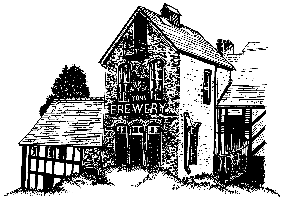
Wilfred Owen.1893-1918
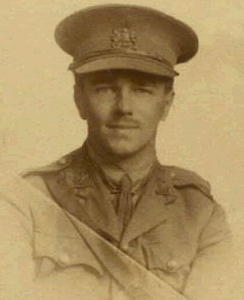
Wilfred Edward Salter Owen was born on 18th March 1893 in Oswestry, Shropshire,
son of Tom and Susan Owen. After the death of his grandfather in 1897 the family moved to Birkenhead (Merseyside). His education
began at the Birkenhead Institute, and then continued at the Technical School in Shrewsbury when the family were forced to
move there in 1906-7 when his father was appointed Assistant Superintendent for the Western Region of the railways. Already
displaying a keen interest in the arts, Owen's earliest experiments in poetry began at the age of 17. After failing to attain
entrance to the University of London, he spent a year as a lay assistant to the Revd. Herbert Wigan at Dunsden before leaving
for Bordeaux, France, to teach at the Berlitz School of English. During the latter part of 1914 and early 1915 Owen became
increasingly aware of the magnitude of the War and he returned to England in September 1915 to enlist in the Artists' Rifles
a month later. He received his commission to the Manchester Regiment (5th Battalion) in June 1916, and spent the rest of the
year training in England.1917 in many ways was the pivotal year in his life, although it was to prove to be his penultimate.
In January he was posted to France and saw his first action in which he and his men were forced to hold a flooded dug-out
in no-man's land for fifty hours whilst under heavy bombardment. In March he was injured with concussion but returned to the
front-line in April. In May he was caught in a shell-explosion and when his battalion was eventually relieved he was diagnosed
as having shell-shock ('neurasthenia'). He was evacuated to England and on June 26th he arrived at Craiglockhart War Hospital near Edinburgh. Had Owen not arrived at the hospital at that time one wonders
what might have happened to his literary career, for it was here that he met Siegfried Sassoon who was also a patient. Sassoon already had a reputation as a poet and after
an awkward introduction he agreed to look over Owen's poems. As well as encouraging Owen to continue, he introduced him to
such literary figures as Robert Graves (a friend of Sassoon's) which in turn, after his release from hospital, allowed Owen
to mix with such luminaries as Arnold Bennett and H. G. Wells. The period in Craiglockhart, and the early part of 1918, was
in many ways his most creative, and he wrote many of the poems for which he is remembered today. In June 1918 he rejoined
his regiment at Scarborough and then in August he returned to France. He was awarded the Military Cross for bravery at Amiens,
but was killed on the 4th November whilst attempting to lead his men across the Sambre canal at Ors. The news of his death reached his parents on November 11th 1918,
the day of the armistice.
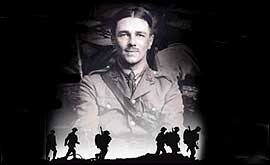
Anthem for Doomed Youth
What passing-bells for these who die as cattle?
-Only the monstrous
anger of the guns.
Only the stuttering rifles' rapid rattle
Can patter out their hasty orisons.
No mockeries now
for them; no prayers nor bells;
Nor any voice of mourning save the choirs,-
The shrill, demented choirs of wailing shells;
And
bugles calling for them from sad shires.
What candles may be held to speed them all?
Not in the hands of
boys but in their eyes
Shall shine the holy glimmers of good-byes.
The pallor of girls' brows shall be their pall;
Their
flowers the tenderness of patient minds,
And each slow dusk a drawing-down of blinds.
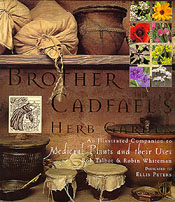
Ellis Peters. 1913 - 1995
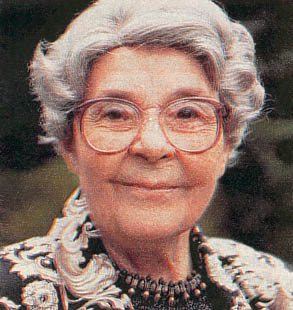
 llis
Peters was the pen name of Edith Pargeter, she was born on September 28 1913 in Horsehay, Shropshire. The prolific and popular
author of the Brother Cadfael medieval mystery series and scores of other books and novels. Although best known for her internationally
bestselling Cadfael books, she also produced contemporary mysteries such as the Inspector Felse series, current affairs novels,
historical novels such as the acclaimed Heaven Tree trilogy, and translations of Czech classics into English. She received
numerous honors during her lifetime: the British Crime Writers Association's Silver Dagger and Cartier Diamond Dagger awards,
an Edgar from the Mystery Writers of America, an OBE (Order of the British Empire) from Queen Elizabeth, and an honorary MA
from Birmingham University, to name but the most illustrious. She was especially proud of her contributions to Czech literature
and the gold medal awarded to her from the Czechoslovak Society for Foreign Relations. Edith Pargeter died in 1995 at the
age of 82, at home in her beloved Shropshire. llis
Peters was the pen name of Edith Pargeter, she was born on September 28 1913 in Horsehay, Shropshire. The prolific and popular
author of the Brother Cadfael medieval mystery series and scores of other books and novels. Although best known for her internationally
bestselling Cadfael books, she also produced contemporary mysteries such as the Inspector Felse series, current affairs novels,
historical novels such as the acclaimed Heaven Tree trilogy, and translations of Czech classics into English. She received
numerous honors during her lifetime: the British Crime Writers Association's Silver Dagger and Cartier Diamond Dagger awards,
an Edgar from the Mystery Writers of America, an OBE (Order of the British Empire) from Queen Elizabeth, and an honorary MA
from Birmingham University, to name but the most illustrious. She was especially proud of her contributions to Czech literature
and the gold medal awarded to her from the Czechoslovak Society for Foreign Relations. Edith Pargeter died in 1995 at the
age of 82, at home in her beloved Shropshire.
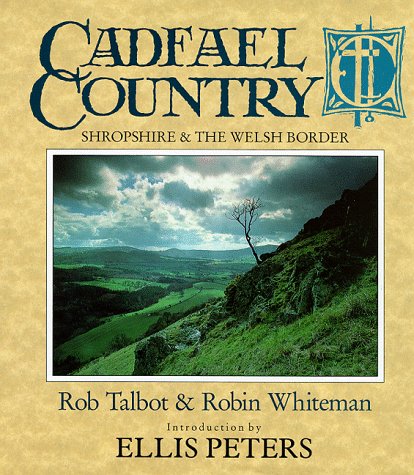
|
 |
|
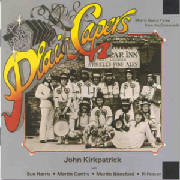
|
| Topic Records. July 25, 1996 |
the music you hear:
Old Molly Oxford
by The John Kirpatrick Band
from their album
Plain Capers-
Morris Dance Tunes
from The Cotswolds
Border Morris Dancing from Shropshire
the official website

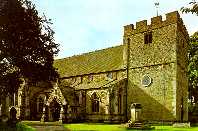
Other Shropshire Links
superb work by
Sabine J. Hutchinson.
Shropshire as you've
never seen it before
Welcome to this gallery
of photographs of
Shropshire, England's
largest inland county.
taken by Mike Hayward
the incredible novel
of Shropshire by
complete e-text.
This website will help you
discover the secrets
of Shropshire's past
just about everything
you want to know about
Shropshire, once more
from the BBC
the folks on the folks
from the BBC
God Bless'em
This website contains
a wide range of local
information and services
for people who are
living in, working in,
or visiting Shropshire.
Shropshire history comes alive
8-10pm
a wonderful programme
brought to you by the
the folks at BBC Radio Shropshire.
with host Genevieve Tudor
to promote knowledge and appreciation
of the lives and works of A.E. Housman
and other members of his family.
a tourism and leisure guide.
and a very good one too!
............can we tempt you?
1881-1927
author of Precious Bane
Of all the districts of England
few offer the beauty,
tranquillity and history
of this wonderous area
Wilfred Owen Links
a page on Great War poetry
poets and music, on our
Walk Awhile website
one of a number of pages
on Wilfred Owen at the
First World War.com website

|
 |
 |
 |
|
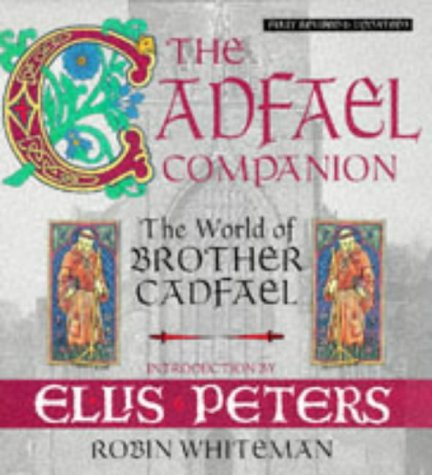
Brother Cadfael Links
need we say more?
photographs from the
television series with
Sir Derek Jacobi as
Brother Cadfael
Steve Conrad's webpages
on the good brother
please be patient while
this site downloads
there are alot of covers,
in various languages.
a complete list of the
Brother Cadfael books
an article entitled
Crusader for Justice.
by Sue Feder
the abbey of
St. Peter and St. Paul
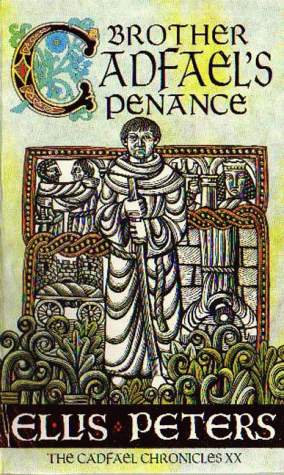
|
|
 |
 |
 |
|
|
|

